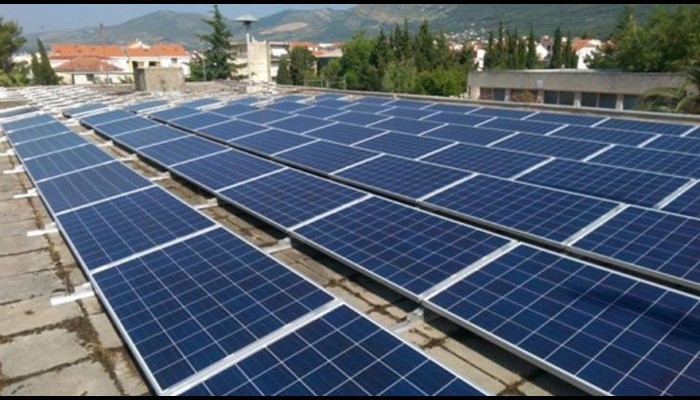China has tightened its grip on Nigeria's fast-growing solar market, accounting for more than 70 percent of all panel shipments to Africa's largest economy in the first half of 2025.
Latest data from the National Bureau of Statistics (NBS) showed that Nigeria imported solar panels worth N242.68 billion ($163 million) between January and June, of which a total of N173.15 billion or 71.38 percent came directly from China.
The surge underscores Nigeria's growing shift toward renewable energy amid China's continued dominance of global solar manufacturing and increasing instability in the national grid. Imports from China dwarfed imports from other suppliers such as the UAE (N28.69 billion) and India (N16.82 billion), cementing Beijing's role as the backbone of Nigeria's distributed energy transition.
Also read: RMB and Circularity Africa support Akodo-ise with solar-powered cold room
Solar imports into Nigeria increased by 17.29 per cent year-on-year from N206.82 billion recorded in the same period in 2024. The NBS said solar panels represent about 2.2 per cent of the country's total merchandise imports of N10.99 trillion during the first half of 2025, a remarkable share considering the forex pressures and high import duties that continue to hamper most sectors.
“The increase in imports shows that Nigerians are increasingly taking power generation into their own hands,” said a Lagos-based energy economist, speaking on condition of anonymity. “Frequent blackouts, diesel costs and irregular grid supply are slowing private solar energy adoption compared to government-led electrification programs.”
The growth in solar panel imports stands in sharp contrast to the decline in formal capital investment in the broader power sector. Capital imports of electricity fell 60.2 percent year-on-year to $22.17 million in the first half of 2025, down from $55.67 million a year earlier, NBS data showed.
Analysts say the differences show that Nigeria's solar expansion is being financed more by households, small businesses and corporate buyers than by large-scale institutional investors. Rooftop installations, mini-grids and commercial hybrid systems are growing rapidly in urban and rural Nigeria as citizens seek to reduce reliance on the fragile national grid.
According to industry estimates, the Nigerian solar market, valued at more than $600 million in 2024, is projected to grow 15%-20% annually until 2030. Demand is rising due to both necessity and falling technology costs, even though short-term prices have been pushed up by the weakness of the naira against the dollar and import barriers.
Nigeria's electricity supply has long remained unreliable. While the country's installed generation capacity is about 13,000 megawatts (MW), available generation rarely exceeds 4,000 MW. Frequent load shedding and widespread blackouts have forced businesses and households to rely on expensive, polluting diesel generators.
Diesel prices averaged N988 per liter in October 2025, making powering even a medium-sized business financially unsustainable. This has made solar power, despite its initial cost, an increasingly attractive long-term option.
“Every day without grid power is a day when solar power becomes more viable,” said a Lagos-based solar developer. “Chinese modules dominate the market due to their competitive pricing, availability and strong distribution network.”
Due to the increasing import bill, there is also a debate in government circles on how to reduce dependence on foreign panels. Authorities are considering incentives to attract investment in domestic solar manufacturing, including possible import restrictions and tax holidays under the Pioneer Status Incentive Scheme.
Nigeria's free trade zones are being positioned as potential hubs for renewable manufacturing, with officials estimating that local production systems could create thousands of jobs while reducing costs.
However, industry players warn that achieving full-scale local manufacturing will require more than policy intent. “Solar production is capital-intensive and supply-chain dependent,” said the CEO of a renewable energy firm. “Without stable power, access to finance and a reliable raw material base, local assembly may remain the most realistic near-term move.”
Nigeria's solar momentum is also impacting regional markets. Neighboring countries, including Niger and Ghana, have launched new off-grid programs, inspired by Nigeria's consumer-driven model. Developers say West Africa could emerge as one of the world's most dynamic distributed solar markets if governments provide continued policy and financing support.
Also read: Nigerian banks are using solar power to cut rising energy bills
Meanwhile, Chinese manufacturers are deepening their presence across Africa, using Nigeria as a gateway to increase market share. Beijing's cost advantage, established supply chains and financing support through its export credit agencies give Chinese companies a strong competitive edge.
Despite the short-term challenges of currency volatility and import dependence, analysts say the increase in solar imports marks an important pivot in Nigeria's energy story from centralized, oil-dependent power generation to decentralized, renewable energy flexibility.
If this momentum is sustained, it could help Nigeria cut diesel consumption, reduce emissions and accelerate progress toward its net-zero commitments. As the government pursues its goal of achieving energy access for all Nigerians by 2030, solar energy, led by imports from China, is rapidly becoming the foundation of that transition.
“Nigeria's solar boom is no longer policy-driven, it's people-driven,” said one industry analyst. “And right now, China is powering that revolution.”











